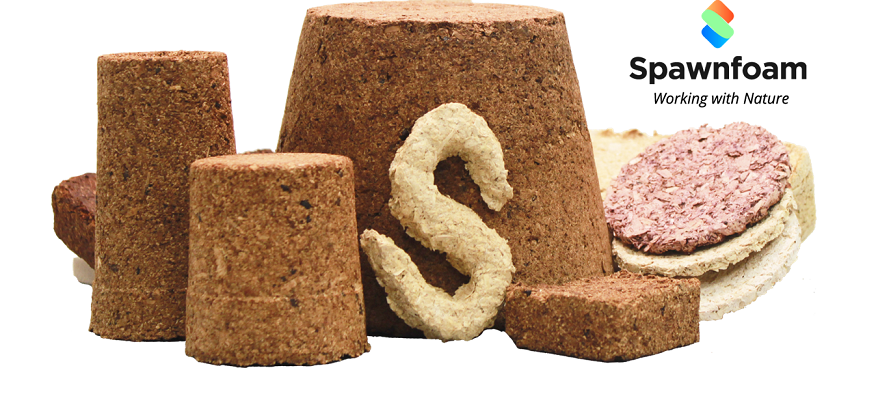In the history of evolution hominids separated from fungi some 650 million years ago. As descendents of fungi, we have more in common with mushrooms than we do with any other kingdom.
Since fungi had reached its full development eons before humans came around, we have a lot to learn from our fungal ancestors.
Mushrooms act as caretakers of our planet, and their ability to break down not just organic material, but hazardous waste, has the potential to make our world a cleaner, healthier place to live.
Portuguese startup Spawnfoam has found a way to tap into these properties of fungi, transforming byproducts of forest-clearing and wine production into biodegradble materials used in everything from construction panels and packaging to making ornamental vases for plants.
Spawnfoam began by producing ornamental and forestry vases and construction panels, but the founders claim to have other ideas up their sleeves.
Packaging, pallets, and furniture are next on the company’s list, according to Publico.

Pedro Mendes
Founded in January 2017 by mechanical engineer Pedro Mendes, a mechanical engineer, and Universidade de Trás-os-Montes e Alto Douro professor Guilhermina Marques, the idea for Spawnfoam came in 2014 when Mendes attended a class where he was introduced to Ecovative Design, an American mycelium biofabrication platform that produces biodegradable and organic composites.
“Initially, we decided to produce the biocomposites using a mushroom fungus, similar to what existed in the US company, but our technology evolved in a totally different way from what they did,” Mendes told Publico.

Guilhermina Marques
Thus the idea was born to take advantage of the raw material existing in Douro, namely the residues of the maintenance of the vineyard and the production of wine.
In 2014 the project was selected for the Passport for Entrepreneurship program of IAPMEI. Participation in the program two years later resulted in the creation of the Spawnfoam.
Read More: Meet the 14 graduated startups from COHiTEC 2016
With the goal of environmental sustainability and efficient use of resources, the Portuguese startup has been testing biodegradable vessels and boards for thermal and acoustic insulation with partners and potential customers.
Additionally, Spawnfoam is developing a biomaterial for the packaging of goods. “There is interest in packaging filling material from one of the largest European furniture manufacturers,” Mendes told Publico, adding, “the motto is simple: leave the world a little better than how it was found.”
After having been a finalist last year in the world’s largest competition for ecological ideas with an impact on climate change, ClimateLaunchpad, Spawnfoam had the opportunity to participate in the JumpStart PRIO startup acceleration program bootcamp, which ran from June 14-15 of this year.
Read More: 2 Portuguese startups win big at Prio Jump Start accelerator
Last May Prio, the biofuel production and exportation company, launched the second edition of the Jump Start accelerator in partnership with imatch, an innovation consulting company that specializes in marketing entrepreneurship, sales, and organizational culture.
Paul Stamets on Mushroom Intelligence
Considered as one of the world’s leading mycologists (people who study fungi), Paul Stamets believes that fungi are sentient and intelligent beings, and that mushroom mycelium, the root-like organism of mushrooms, is earth’s natural internet.
Through mycelium, mushrooms communicate and exchange information with one another, and they form symbiotic relationships with plants and trees where they exchange water and nutrients.
Examples of these include the red-topped, white-spotted Amanita muscaria, which grows in a symbiotic relationship with pine trees, and oyster mushrooms, which grow on decaying wood.
In his TED talk, Stamets gave an intriguing monologue on 6 ways mushrooms can save the world.

